MyOHUN ANNUAL REPORT
MALAYSIA ONE HEALTH UNIVERSITY NETWORK







This Annual Report is made possible by the generous support of the American people through the United States Agency for International Development (USAID). The contents are the responsibility of MyOHUN under the One Health Workforce – Next Generation Project (OHW-NG) and do not necessarily reflect the views of USAID or the United States Government.
Personal protective equipment, distancing, and group size standards in this photo were consistent with local public health guidance and COVID-19 status in the specific country and time it was taken. This may not reflect best practices for all locations where COVID-19 is still spreading.
13.
Shadow Pandemic of Misinformation and Scapegoating of Wildlife
14.
Refining Master of Injections Matrix with Subject Matter Experts
15.
Webinar Series on Gender: The Importance of Gender in Disease Management and Outbreak Response
16.
World Zoonoses Day Webinar: Preventing the Next Pandemic
17.
Virtual One Health Field Epidemiology Training
18.
Safety Awareness Training on the Importance of COVID-19 Disease Among e-hailing and p-hailing Services Community
19.
Training on WHONET for AMR Data Management in Animal Health
Assessment of One Health Training Impact
21.
20. MyOHUN COVID-19 Emergency Fund


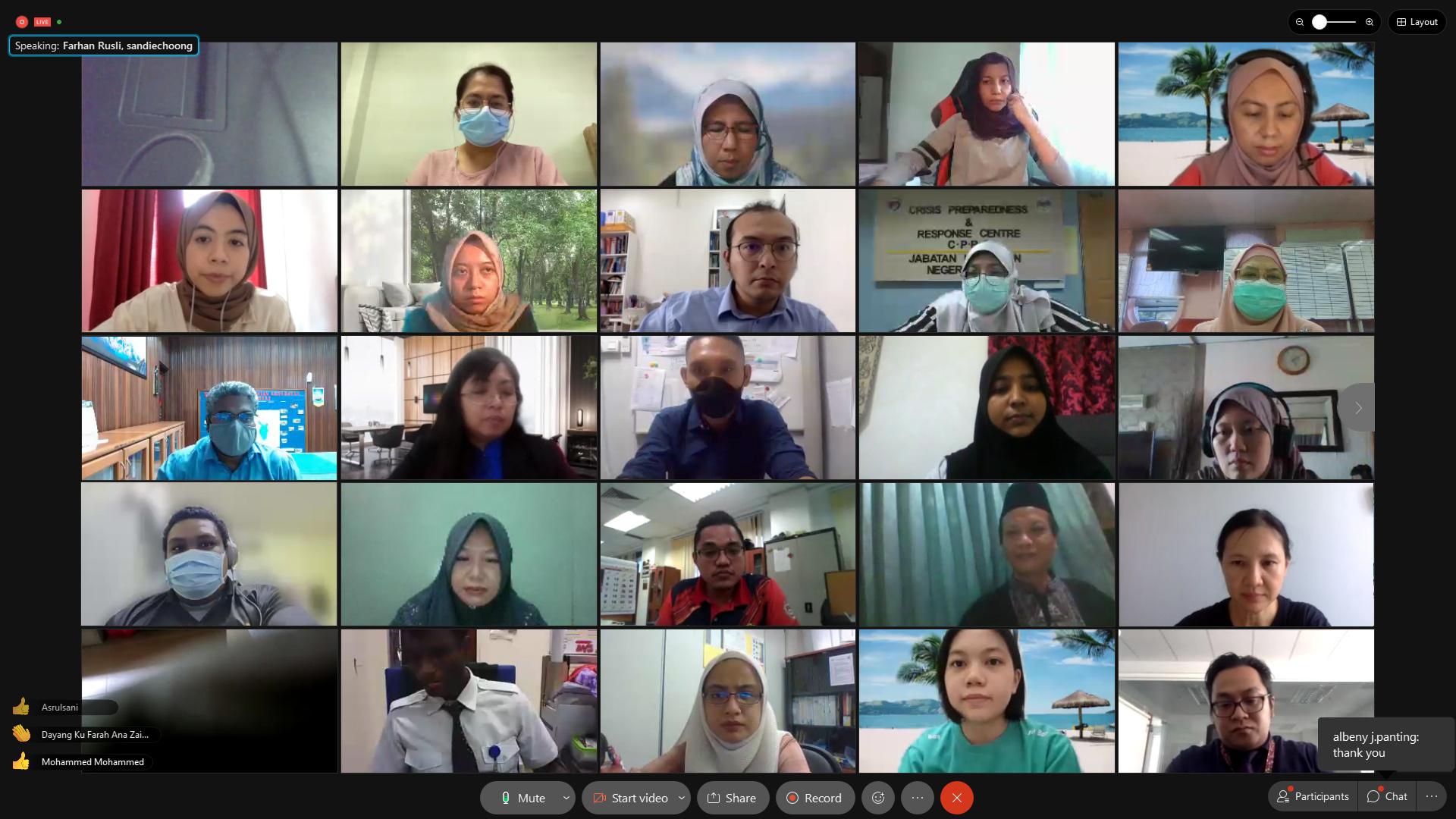

Words such as Lost, Chaos, Lockdown, Quarantine, Isolation, Despair, and Scary have been used to describe 2020, the year of the COVID-19 Pandemic. 2021 is dominated by a mixture of emotionally charged words such as Relief, Anticipation, Exhaustion, Enlightening, and Resilience.
Some of us may have come to terms that the pandemic is very much with us and probably will never go away, so the year 2021 is the year that we slowly came out from our cocoon to once again be re-introduced to the old yet much-altered world. So, if there is one word to choose for 2021, it should be “Resilience’ as it embraces hope, faith, and possibilities.
At the National Coordinating Office, we love the word ‘resilience’ and ‘perseverance’ because that was how we operated throughout 2021… with high hopes, faith, and anticipation of various possibilities. Given the uncertainties and limitations of the pandemic, it was challenging at many levels to run training programs. Amongst others, we have to deal with organizational, technical, procedural, and individual challenges. Situations were precarious, and policies may change depending on the disease circumstances. Trainees or trainers may not yet be comfortable congregating in confined spaces despite the miracles of vaccines. As a result, our planned activities must be adapted and conducted mainly virtually, except for a few that were given special permission by the relevant authorities to be run physically.

As with all our activities, it is impossible to execute them without the commitment of our leaders and committee members. Despite the challenges, limitations, and mundaneness of the virtual platform, most of our planned activities were well executed. So, hats off to the Project Leaders and their team for creatively organizing the activities virtually that match the impact expected through physical training.
2021 has been a year of forced slow downs, but it allowed many a time for self-reflection, increased mindfulness, deeper gratitude, and appreciation. We thank you all for contributing to 2021 and look forward to a better year in 2022.

Malaysia One Health University Network (MyOHUN) was built to promote the philosophy and spirit of One Health in working together to respond to new and re-emerging infectious and zoonotic diseases. It was initiated in 2012 as part of the Southeast Asia One Health University Network (SEAOHUN), receiving funds from the United States Agency for International Development (USAID). MyOHUN, at present, comprises 17 universities and three ministries under its wings. Working under the umbrella of One Health, MyOHUN outlined our own vision, mission, and goals to mobilize the network.
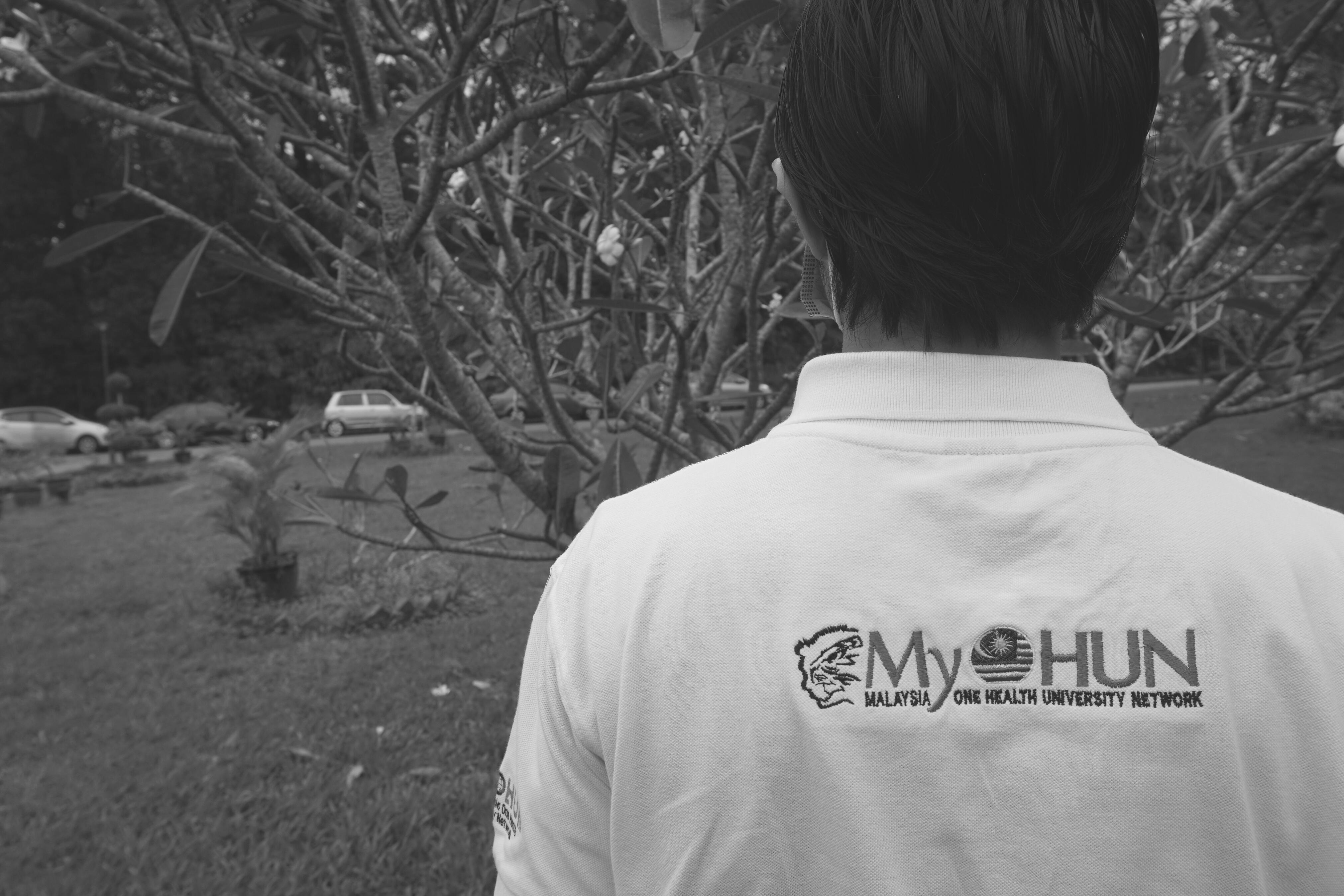
To strengthen One Health Workforce policy on environment and stakeholder engagement.
Network of social and intellectual excellence on One Health against infectious and zoonotic diseases of national and global concern.
To link and enable universities, government, and relevant agencies to generate social and intellectual capital on One Health against infectious and zoonotic diseases.
To increase the capacity of universities, government, and related agencies to identify and address One Health Workforce needs.
To increase One Health Workforce’s capacity to detect, prevent, and respond to infectious and zoonotic diseases.

The tiger represents the national symbol of Malaysia, and it plays a key role in maintaining healthy ecosystems as it is a natural guardian of forests. The blended image of the human and tiger heads ensures harmonious co-existence, the synergistic collaboration of human and animal research and discipline in the spirit of One Health and stands for environmental concerns. While other animals were considered, e.g., the orangutan and the hornbill, we felt that the tiger had a “strong” presence.
As part of the One Health concept, the green colour reflects what we conventionally associate with nature, as green is the colour of nature and a pollution-free environment.
The Malaysian flag is shaped in style with the letter “O” perfectly to represent “One” nation/Malaysia embracing the One Health concept.

 Green Coloured Font
Green Coloured Font
UNITES STATES AGENCY FOR INTERNATIONAL DEVELOPMENT (USAID)
SOUTHEAST ASIA ONE HEALTH UNIVERSITY NETWORK (SEAOHUN)
MyOHUN EXECUTIVE BOARD
MyOHUN CHAIRMAN
NATIONAL COORDINATING OFFICE (NCO)
MyOHUN MEMBERS (UNIVERSITIES, MINISTRIES, AGENCIES)
UPM VICE CHANCELLORProf. Dr. Abdul Rahman Omar
Universiti Putra Malaysia
YBhg. Prof. Dato’ Dr. Mohd Hair Bejo Universiti Putra Malaysia
YBhg. Dato’ Abdul Kadir bin Abu Hashim Department of Wildlife and National Parks Peninsular Malaysia
Prof. Dr. Sazaly bin Abu Bakar Universiti Malaya
YBhg. Datuk Dr. Norhayati binti Rusli Ministry of Health
YM Prof. Dr. Raja Affendi Raja Ali Universiti Kebangsaan Malaysia
Prof. Dr. Mohd Rizal Abd Manaf Universiti Kebangsaan Malaysia
Prof. Dr. Latiffah Hassan Universiti Putra Malaysia
YBhg. Dato’ Dr. Norlizan Mohd Noor Department of Veterinary Services
Dr. Rozanah Asmah Abd Samad Department of Veterinary Services Dr. Rohani Jahis Ministry of Health
Prof. Dr. Suzana Shahar Universiti Kebangsaan Malaysia
Prof. Dr. Hidayatulfathi Othman Universiti Kebangsaan Malaysia
FINANCE OFFICER
PUBLICITY& COMMUNICATIONOFFICER
Muhammad A'fifudin Hj Md Isa
FINANCE OFFICER II
PUBLICITY& COMMUNICATIONOFFICER
Nur Elyana Ab Rahman
CHAIRMAN
CHAIRMAN
COORDINATOR
COORDINATOR
Dr. Nur Indah Ahmad DEPUTY COORDINATOR
PROJECT MANAGER
Raja Khairul Adli Raja Kamalzaman
ADMINISTRATION OFFICER
PUBLICITY& COMMUNICATIONOFFICER
Azman Kamarudin
ADMINISTRATION OFFICER
PUBLICITY& COMMUNICATIONOFFICER
Mohd Shafik Mohammad Anizar
IT & NETWORK OFFICER
PUBLICITY& COMMUNICATIONOFFICER
Mohd Nazrien Zaraini
PUBLICITY & COMMUNICATION OFFICER
PUBLICITY& COMMUNICATIONOFFICER
Norsaiful Bahri Abdul Habib
I n s t i t u t e o f M e d i c a l R e s e a r c h N a t i o n a l P u b l i c H e a l t h L a b o r a t o r y D e p a r t m e n t o f V e t e r i n a r y S e r v i c e s V e t e r i n a r y R e s e a r c h I n s t i t u t e D e p a r t m e n t o f W i l d l i f e a n d N a t i o n a l P a r k s P e n i n s u l a r M a l a y s i a N a t i o n a l D i s a s t e r M a n a g e m e n t A g e n c y M y O H U N A f f i l i a t e d G o v e r n m e n t M i n i s t r i e s a n d O r g a n i z a t i o n s
1 8 . M I N I S T R Y O F H E A L T H 1 9 . M I N I S T R Y O F A G R I C U L T U R E A N D A G R OB A S E D I N D U S T R Y M A L A Y
2 0 . M I N I S T R Y O F N A T
Emerging threats such as the 2019 novel coronavirus epidemic, which likely originated in wildlife and spreads to humans, highlight the importance of a well-prepared and technically skilled One Health workforce for disease prevention, detection, and response. The complex nature of these emerging health threats is a reminder that a largescale multidisciplinary network of health professionals is required to strengthen our biodefenses and for achieving global health security.
The USAID One Health WorkforceNext Generation (OHW-NG) project promotes global health security by empowering One Health University Networks in Africa and Southeast Asia to build human resources and bolster the workforce for more effective disease surveillance and control. Using a variety of pre-service and inservice formats, including One Health student clubs and experiential learning, OHW-NG is fostering One Health competencies.
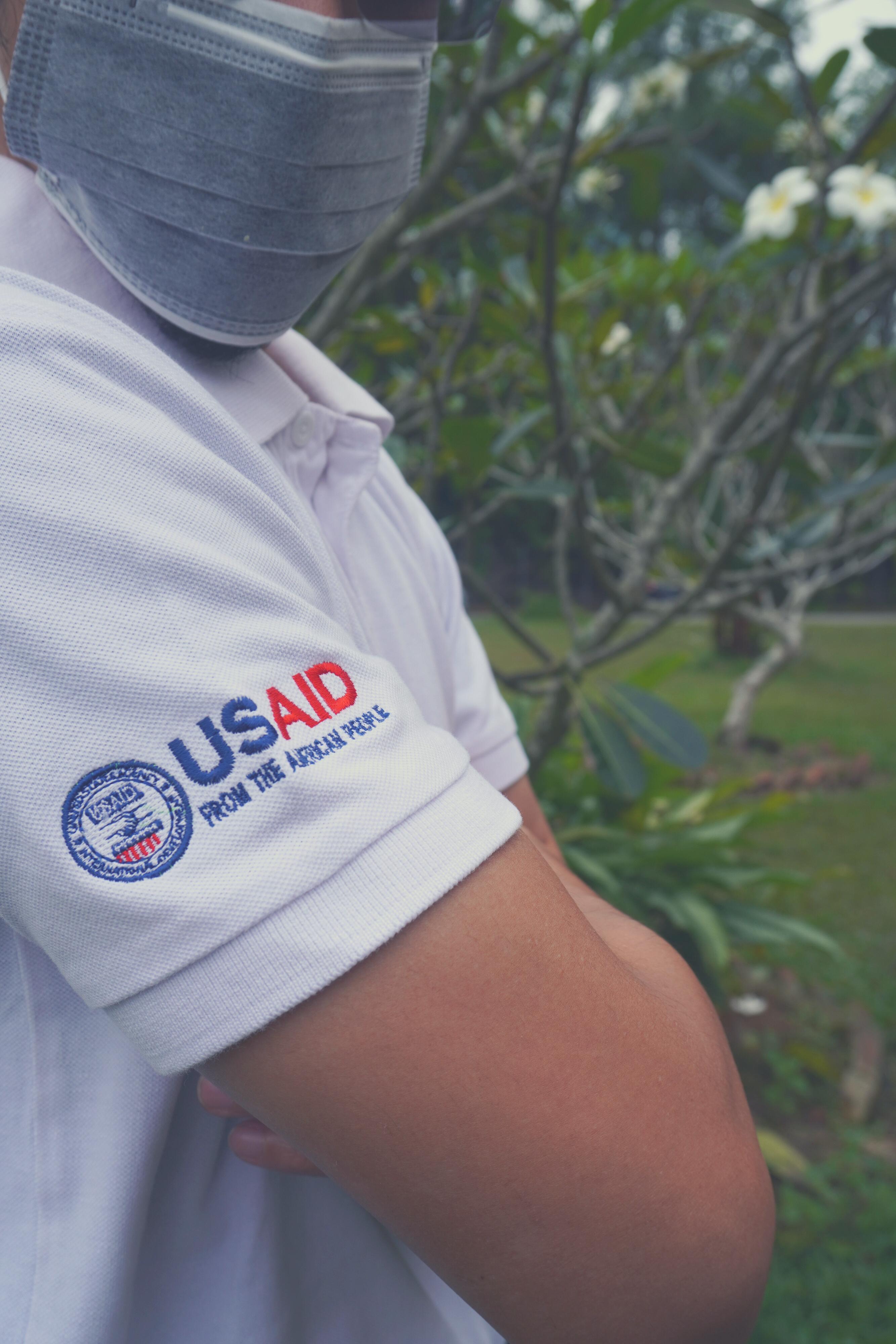


As COVID-19 cases surged in Malaysia, the Malaysia One Health University Network (MyOHUN) activated its second call for volunteers in January 2021 to assist the Crisis Preparedness and Response Centre (CPRC) through active collaboration with the Ministry of Health in their efforts to manage the spread of the virus. In addition, MyOHUN utilized multiple social media and networking platforms, reaching universities, public and private agencies all around the country.
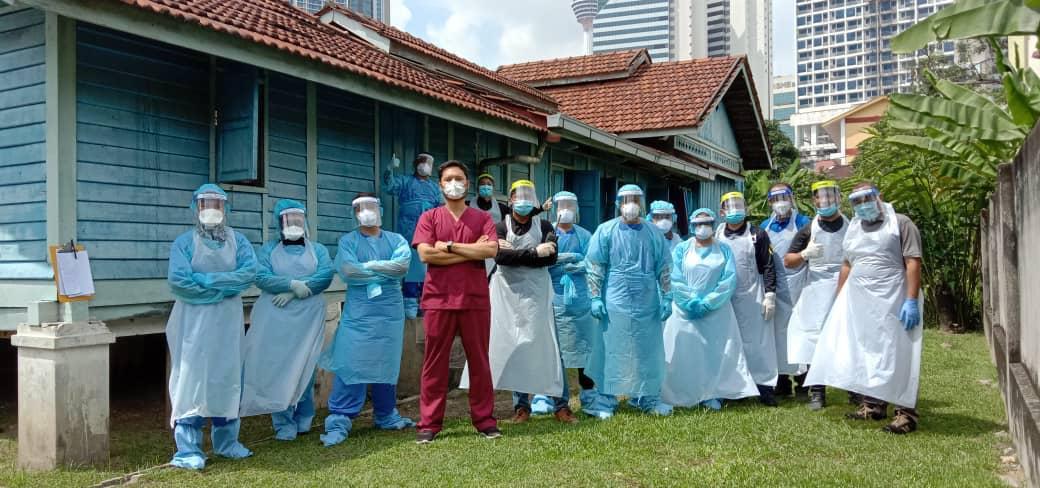
MyOHUN announced the first call for volunteers in March 2020 during the early phase of the pandemic. The call succeeded in enlisting more than 1000 volunteers to help hospitals and health centers under the Ministry of Health with the positive cases and laboratories for COVID-19 screening tests. Despite pandemic-induced fatigue and other challenges, a second call recorded responses from more than 250 health-related personnel. The call for volunteers immediately captured the attention of the Ericsen Foundation.



The Foundation launched Malaysia's COVID-19 Charity Drive program to help institutions fight COVID-19 in Malaysia. After seeing MyOHUN’s call for volunteers, Ms. Chew Meng Li, a representative for the Ericsen Foundation, contacted Assoc. Prof. Dr. Chee Hui Yee from Universiti Putra Malaysia Teaching Hospital (HPUPM) and offered sponsorship in the form of medical supplies, small equipment, and consumables. Ericsen Foundation also contributed to COVID-19 screening among refugees registered under the United Nations High Commissioner for Refugees, which also received support/initial funding from USAID through the COVID-19 Emergency Tranche Fund.
COVID-19 has impacted the communities more than we can imagine. A single act of kindness may directly cushion the negative impact of the pandemic to a degree, but more importantly, it may generate a snowball effect of good deeds from all directions. So…pay it forward, everyone. MyOHUN did!
Chew Meng Li, the Financial Officer for the “Malaysia COVID-19 Charity Drive” of the Ericsen Foundation.
I saw MyOHUN’s post on Facebook calling for volunteers and thought that this is an opportunity to help the overburdened medical system as the rate of infection increased every day because we are in this together
On 30th September 2021, the Ministry of Higher Education and Malaysia One Health University Network (MyOHUN) jointly launched a virtual training module entitled “Guidelines Module for Higher Learning Institutions: Risk and Crisis Communications for Public Health and Institutional Resilience.” The ceremony was officiated by Datuk Seri Dr. Noraini Ahmad, Minister of Higher Education.

The launching event received wide coverage in various local news media outlets, such as the New Straits Times and Berita Harian, providing a platform for national recognition of MyOHUN’s achievement during the pandemic. Following the launching ceremony, a webinar reaching more than 250 participants throughout the country was conducted, led by Prof. Dr. Azmawani Abd Rahman from Universiti Putra Malaysia.
Datuk Seri Dr. Noraini Ahmad, Minister of Higher Education.
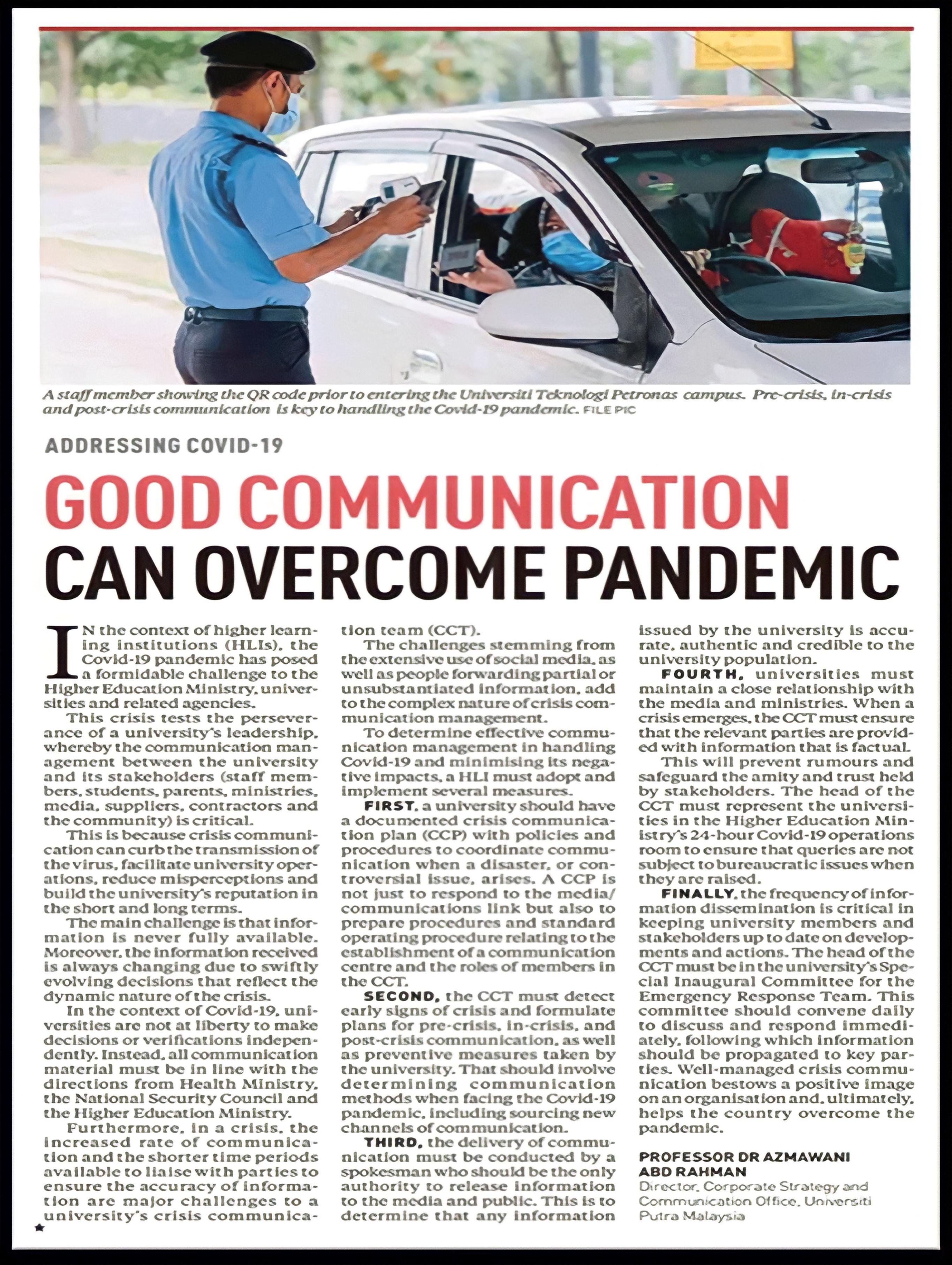
The launching of this module is very timely and will be very beneficial as higher learning institutions will be reopened soon
The module was developed in collaboration with MyOHUN and the Ministry with support from the United States Agency for International Development’s One Health Workforce - Next Generation Project. Focusing on communication barriers and challenges during disasters and crises, this module highlights an action plan and risk communication strategies and offers best practices and suggestions for universities and other higher learning institutions throughout the preparedness, response, and recovery phases of infectious disease outbreaks. The module represented a productive collaboration from 41 select experts on risk management, workplace occupational safety and health, corporate communications, and university top management throughout the country.
MyOHUN envisions this module to be useful for all higher learning institutions in Malaysia that is tailored to suit the needs of any local institution.
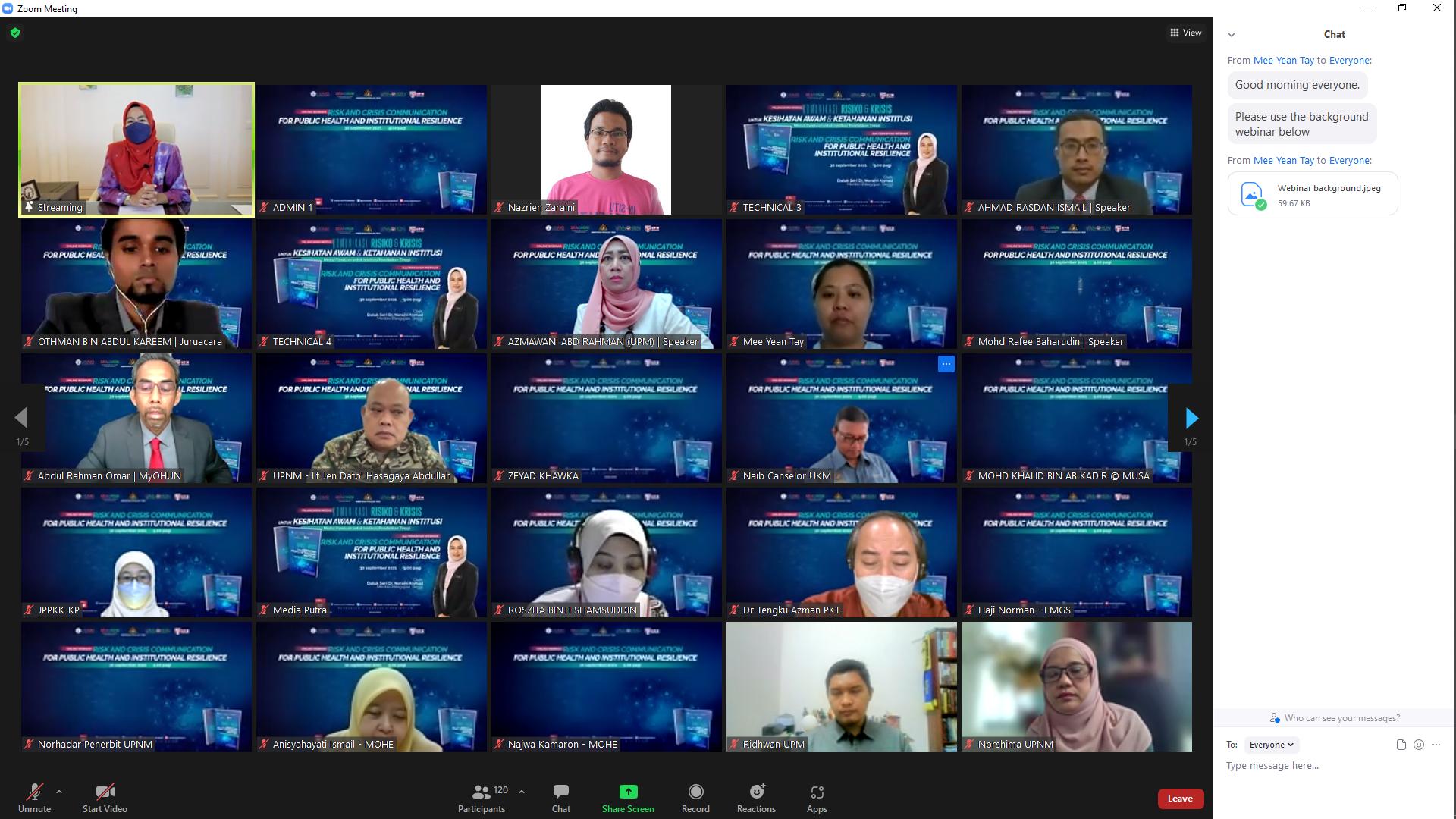

Malaysia One Health University Network (MyOHUN), in conjunction with the celebration of One Health Day on 3rd November, organized a webinar entitled ‘Vilifying Wildlife in the Age of Pandemics: Confronting Fears and Misconceptions.’



MyOHUN brings together renowned global wildlife veterinarian and epidemiologist Dr. Jonathan Epstein of the Science and Outreach EcoHealth Alliance, wildlife conservationist Prof. Dato’ Dr. Mohd Tajuddin Abdullah of the Academy of Sciences Malaysia, and journalist Simone McCarthy of South China Morning Post to share their insights and research on the ecology of disease emergence, wildlife conservation and the media’s role in shaping public perception regarding pandemic emergence, thereby debunking the stereotype that all wildlife carries deadly infectious diseases and can easily infect humans.
Reaching more than 500 viewers worldwide, MyOHUN is optimistic that the webinar had raised awareness about the welfare and protection of wild animals to maintain balance and harmony of the entire ecosystem.


More than 500 viewers from multiple countries

30th March 2021
Le
19 subject matter experts
A pilot activity, Refining Master of Injections Matrix with Subject Matter Experts (SMEs), was held on 30th March 2021. Nineteen SMEs gathered in Le Meridien Hotel, Putrajaya, to determine the best approach to run the Anthrax Disaster Simulation Exercise, including scenario, gamification tool, tabletop exercise, participants, and platform. Relevant first responders, including the ERT's and other experts and personnel from the animal and human health sectors, Royal Malaysia Police (PDRM), and policy-makers attended the activity to provide their inputs on the preliminary scenario concept for the Master of Injection Matrix (MIM) development. Besides that, the activity provided initial collaboration in a friendly environment for further inter-agency engagement during the simulation exercise. The inperson simulation exercise scheduled to take place in August 2021 was, however, cancelled following the Movement Control Order (MCO) imposed by the government.
 Associate Professor Dr. Rosnah Ismail Universiti Kebangsaan Malaysia
Associate Professor Dr. Rosnah Ismail Universiti Kebangsaan Malaysia
MyOHUN organized two virtual webinars to address the issue of gender in One Health with the aim of creating awareness and understanding of the importance of gender in managing and understanding the occurrence of zoonoses and emerging pandemics.




The Roles and Challenges of Gender in Zoonotic Diseases webinar, the first of the two-part webinar series, was held on 8th April 2021 with 151 attendees worldwide. The second webinar, Gender Challenges in Zoonotic Infections, convened on 29th May 2021, with 87 audiences participating during the live webinar.

These 2-part webinars highlighted the important aspects of gender when discussing One Health, the first of its kind to be conducted in the country. It is a much-needed topic that needs to be sensitized in the current era, especially among academics, policy-makers, and the future One Health workforce. Furthermore, the webinars were able to gauge participants from many countries worldwide, indicating a high interest in this topic to be further emphasized in future activities.
First Webinar: 8th April 2021
Second Webinar: 29th May 2021



Virtual platform
In total, more than 250 participants worldwide
Professor Dato’ Dr. Abdul Rashid Khan RCSI & UCD Malaysia CampusIn commemorating World Zoonoses Day, the Malaysian Ministry of Health held a webinar entitled Preventing the Next Zoonotic Pandemic on 6th July 2021, in collaboration with MyOHUN.




The webinar convened experts, namely Prof. Dr. Bruce Wilcox, the Director of the Global Health Group International, Prof. Dr. Latiffah Hassan, MyOHUN Coordinator, Teresa Yong Sui Mien from the National Institute of Health Malaysia, and Tom Hughes from EcoHealth Alliance, working in various areas of One Health. Together, they shared their perspectives on important aspects to be considered to prevent future pandemics and the latest updates on the current zoonotic threats in Malaysia.



With a huge turnout of 658 attendees, the webinar proved to be a huge success. Audiences also actively participated during the Q&A sessions on the issue and how they could prevent the next pandemic.
6th July 2021
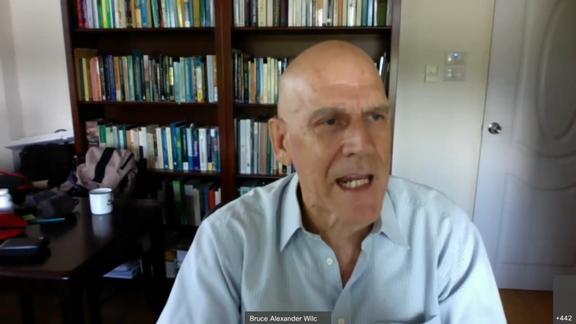
The One Health Field Epidemiology
Training was executed virtually for the first time this year. Combining officers and academicians from various disciplines, the training was held from 8th to 10th September 2021. Thirty-eight participants attended this 3-day training in applying One Health competencies to respond efficiently when managing an infectious disease outbreak. This training empowered the current One Health workforce with one of the most important technical and core competencies for outbreaks preparedness and management which is field epidemiology.
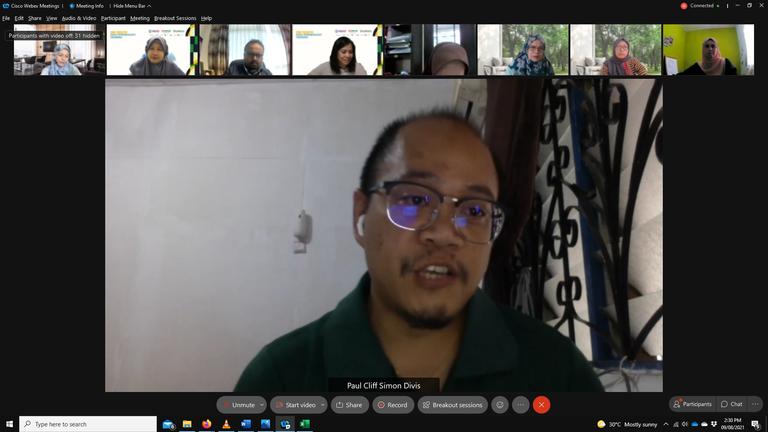
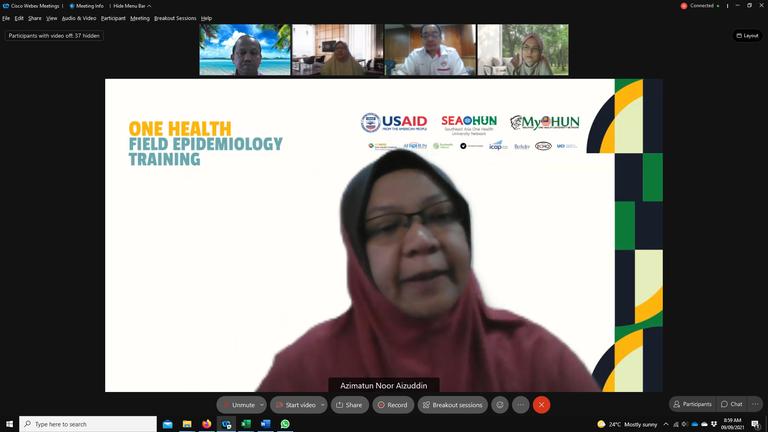
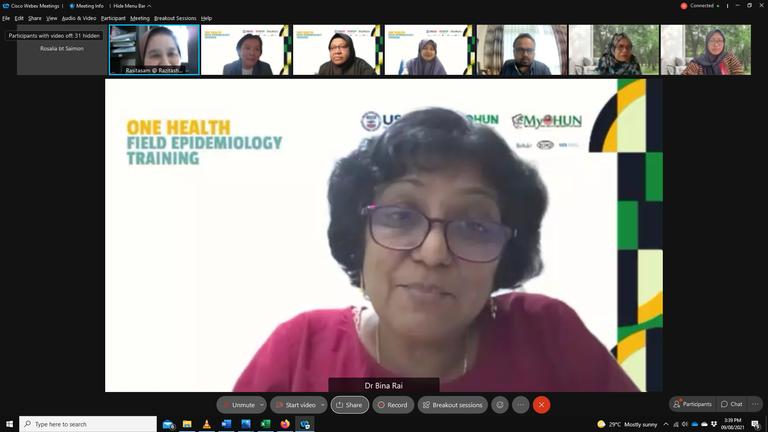

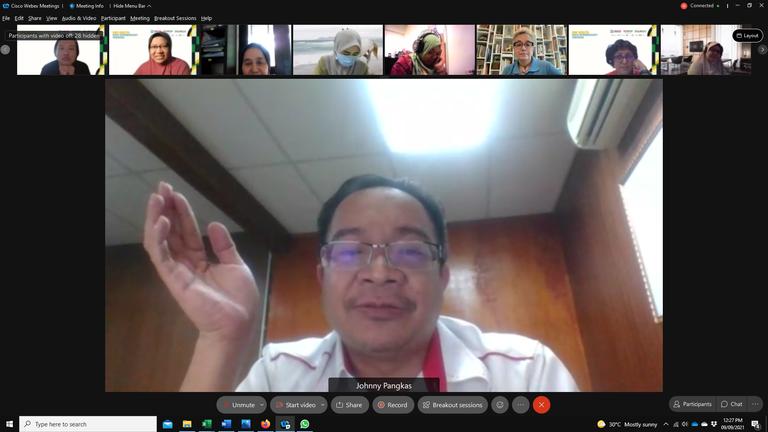

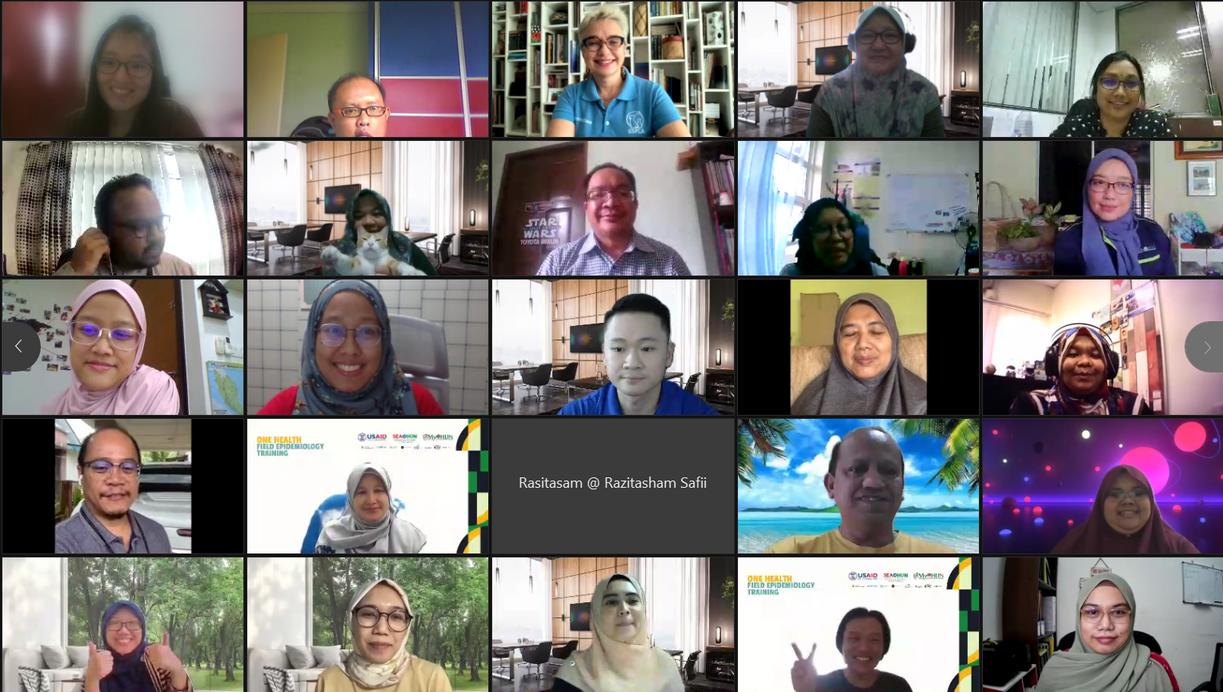
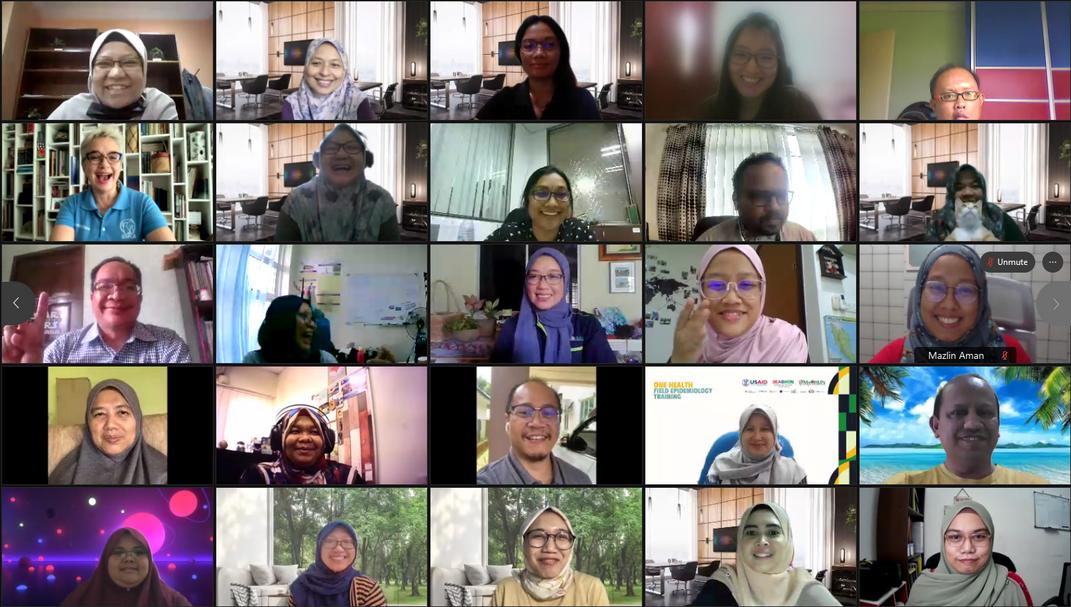

8th to 10th September 2021
Professor Dr. Razitasham Safii
Universiti Malaysia Sarawak
VENUE PARTICIPANTS
Participants: 38 in-service One Health workforce from various agencies Facilitators: 8
PROJECT LEADER Virtual Platform
27th to 30th September 2021
From 27th to 30th September 2021, a training on Safety Awareness on the Importance of COVID-19 among ehailing and p-hailing Services Community was held to increase awareness about infectious disease transmission to the communities of ehailing and p-hailing services. The training was given special permission by the National Security Council of Malaysia.
176 e-hailing and p-hailing participants from various companies completed the training on safety awareness on the importance of COVID-19. Participants were exposed to steps to be taken should they be exposed or have to handle clients/customers with different COVID-19 infection statuses or close contact statuses, including those who tested positive for COVID-19 and those placed under investigation/surveillance. They were also taught the different types of disinfectants, how to disinfect their vehicles properly, and how to wear personal protective equipment
176 riders/drivers o
Thirty-six officers and laboratory technicians attended the 3-day training virtually through the online platform from 29th September to 1st October 2021. The Department of Veterinary Services took this opportunity to train officers to apply data management in animal health to standardize laboratory configurations since WHONET is being used widely all around the globe.
The training covers Laboratory Configuration, Data Entry and Data Analysis of WHONET, introduction and revision of the BacLink program. Following this training, all participants will be able to increase the efficiency of the departments and agencies where they work in collecting, organizing, analyzing, and reporting data and findings from the animal health sector in Malaysia in an effort to better understand the current status of AMR in the country in a One Health approach.


29th September 2021 to 1st October 2021
36 officers and laboratory technicians
Dr. Mariani Binti Hashim Department of Veterinary Services Virtual Platform





The National Coordinating Office (NCO) of MyOHUN collaborated with a local human resource development partner at UPM to assess six (6) key MyOHUN training activities; Community Education and Field Training in Belum, Field Epidemiology Training Program, In-Situ Problem-based Learning, One Health Young Leaders and Communicators, Tabletop Simulation Exercise, and Training on the Prevention of Wildlife Zoonoses and Ecosystem Health. Focus group discussions and an online survey recruiting past-activity participants were conducted to collect data. A total of 267 students, 17 staff, and 52 academics responded to the surveys. The findings concluded from the assessment and analyses done have provided the necessary information for MyOHUN to further improve its training content and structure.



 Associate Professor Dr. Roziah Mohd Rosdi
Associate Professor Dr. Roziah Mohd Rosdi
The MyOHUN COVID-19 Emergency Fund was provided by the United States Agency for International Development (USAID) and supported by the Southeast Asia One Health University Network (SEAOHUN) to aid 23 COVID-19-related projects in creating awareness, providing resources, and funding research under two technical areas, namely:
Risk Communication to Protect Public Health
Diagnostic Testing and Surveillance

Upon completing the projects, a webinar was held to showcase the results, outputs, and products presented by the respective Principal Investigators. As a result, twelve projects under Risk Communication to Protect Public Health were presented on 29th September 2021, and on 30th September 2021, eleven projects under Diagnostic Testing and Surveillance were presented.

The projects under the MyOHUN COVID-19 Emergency Fund produced a number of products. A few that can be highlighted are as follows:
A module entitled “Risk and Crisis Communication for Public Health and Institutional Resilience: Guidelines for Higher Learning Institutions” addresses One Health's technical competency of risk communication during a disease crisis, adapted and tailored to suit any higher learning institution in Malaysia.
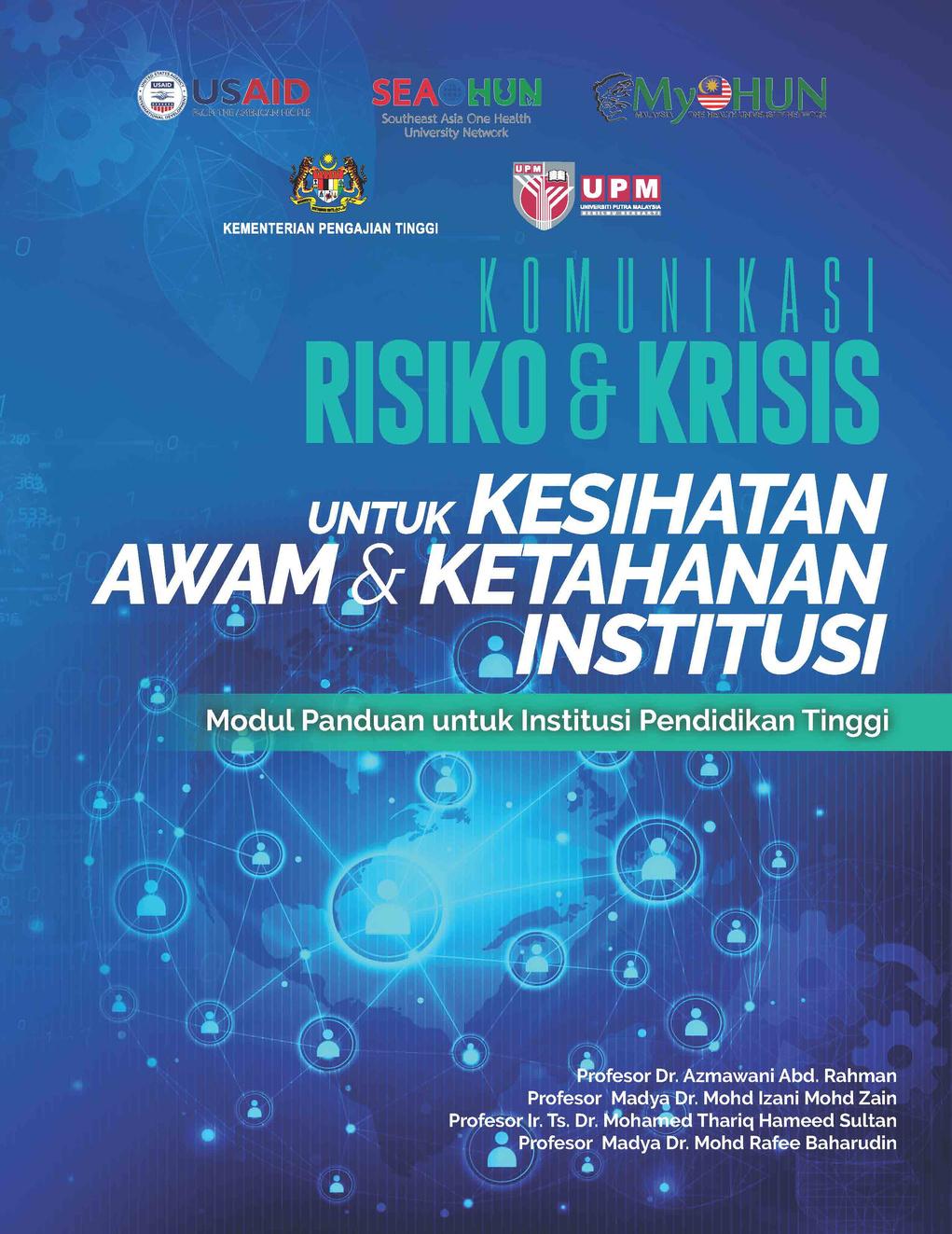
Training Manual and Video for Risk Management of COVID-19 tailored for the marginalized Rohingya Community were developed to train community risk managers to spread knowledge and awareness to equip them with necessary preventative measures during the pandemic.

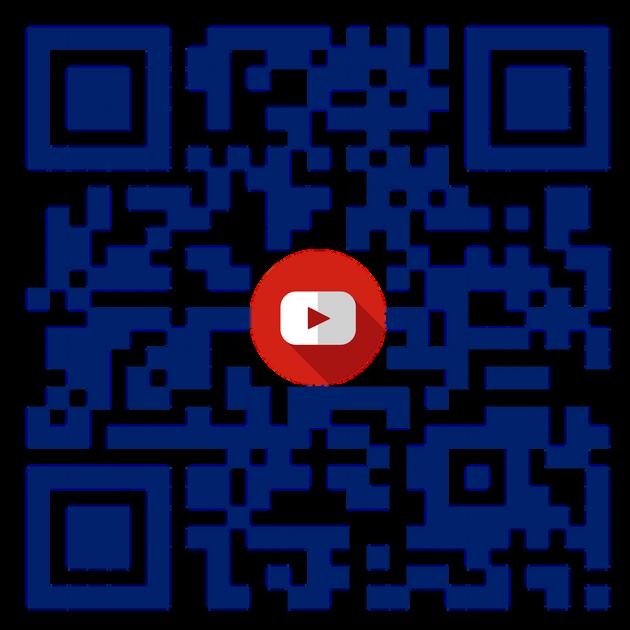

Nine (9) edutainment videos were produced to increase awareness and provide reminders of COVID-19 risk to a specific group of people – children and high-risk individuals – on how to behave in the new norms. Since only a few instructional edutainment videos target a specific group of people, each video reached more than five thousand views on Facebook.

Assoc. Prof.Dr. Chee Hui Yee
Universiti Putra Malaysia (UPM)
COVID-19 RT-PCR Screening for Refugees
Registered under UNHCR
Prof. Dr. Syafinaz Amin Nordin
Universiti Putra Malaysia (UPM)
COVILaM (COVID-19 Laboratory Module): A Training Module for the Laboratory Testing and the Interpretation of the Results for Coronavirus Disease (COVID-19)
Dr. Farina Mustaffa Kamal
Universiti Putra Malaysia (UPM)
Biosurveillance and Infection Transmission Risk Assessment and SARS-CoV2 in Cats, and Evaluation of Knowledge, Attitude, and Practices towards COVID-19 among Pet Owners
Assoc. Prof.Dr. Rosediani Muhammad
Universiti Sains Malaysia (USM)
Preventive Measures, Safety Practices and Chronic Patients’ Care during COVID-19 Pandemic in Outpatients’ Clinic, Hospital Universiti Sains Malaysia
Assoc. Prof. Dr. Azian Harun
Universiti Sains Malaysia (USM)
Screening for Respiratory Pathogens in SARSCoV2 PCR Negative Symptomatic Patients during COVID-19 Pandemic
Prof. Dr. Sazaly Abu Bakar
Universiti Malaya (UM)
Enhancing MyOHUN One Health Workforce Capability in Laboratory Detection of SARS-CoV2 (COVID-19)
Assoc. Prof. Dr. Ashley Edward Roy Soosay
Universiti Malaysia Sarawak (UNIMAS)
SARS-CoV2 Detectionat UNIMAS COVID-19 Laboratory
Assoc. Prof. Dr. Tan Cheng Siang
Universiti Malaysia Sarawak (UNIMAS)
Multi-sectoral Training in COVID-19 Diagnostic Testing with a Safe and Ergonomic Environment
Assoc. Prof. Dr. Tan Cheng Siang
Universiti Malaysia Sarawak (UNIMAS)
Improving Respiratory Protection via Respirator Training and Fit Testing
Prof. Dr. Ariza Adnan
Universiti Teknologi MARA (UiTM)
Seroprevalence on SARS-CoV2 among Blood Donors in Klang Valley, Malaysia
Dr. Maswati Mat Amin
Department of Veterinary Services (DVS)
Establishment of COVID-19 Diagnostic Test using RTPCR in Four DVS Diagnostic Laboratories in Malaysia
Assoc. Prof. Dr. Nurul Azmawati
Universiti Sains Islam Malaysia (USIM)
The Development and Evaluation of Hand Hygiene Educational Box
Dr. Zatul-Iffah Abu Hassan
Universiti Sains Islam Malaysia (USIM)
COVID-19 Online Educational Program for Youngster
Dr. Hana Maizuliana Solehan
Universiti Sains Islam Malaysia (USIM)
COVID-19 Medical Edutainment Video Series Project
Dr. Ummu Aiman Faisal
Universiti Sains Islam Malaysia (USIM)
Hand Washing Technique and Proper Mask Wearing and Removal
Asst. Prof. Dr. Mohammad Farhan Rusli
International Islamic University Malaysia (IIUM)
Training for Community Risk Manager in Kuantan, Pahang
Dr. Yap Wei Boon
Universiti Kebangsaan Malaysia (UKM)
Speak the Risk Language
Assoc. Prof. Dr. Mohd Rohaizat Hassan
Universiti Kebangsaan Malaysia (UKM)
Comprehensive Artificial Reality Simulation & Field Training for COVID-19 Pandemic among Health Care Workers (CARS-FT)
Assoc. Prof. Dr. Mohd Dzulkhairi Mohd Rani
Universiti Sains Islam Malaysia (USIM)
A Risk Communication Programme to Enhance the Awareness and Practice of COVID-19 Prevention among Indigenous Orang Asli Communities in Malaysia
Prof. Dr. Mohammad Saffree Jeffree
Universiti Malaysia Sabah (UMS)
COVID-Shields@University: Development of Digital Application, Manual for Preparedness and Surveillance, and Diagnostic and Surveillance of COVID19 at the University Level
Dr. Rozaihan Mansor
Universiti Putra Malaysia (UPM)
Risk Communication and Risk Engagement: The University Veterinary Hospital, UPM Approach
Prof. Dr. Azmawani Abd Rahman
Universiti Putra Malaysia (UPM)
Risk Communication to Protect Public Health
Prof. Dr. Aziah Daud
Universiti Sains Malaysia (USM)
Training the Frontliners and University Postgraduate Students on Risk Communication to Protect Public Health in COVID-19 Pandemic
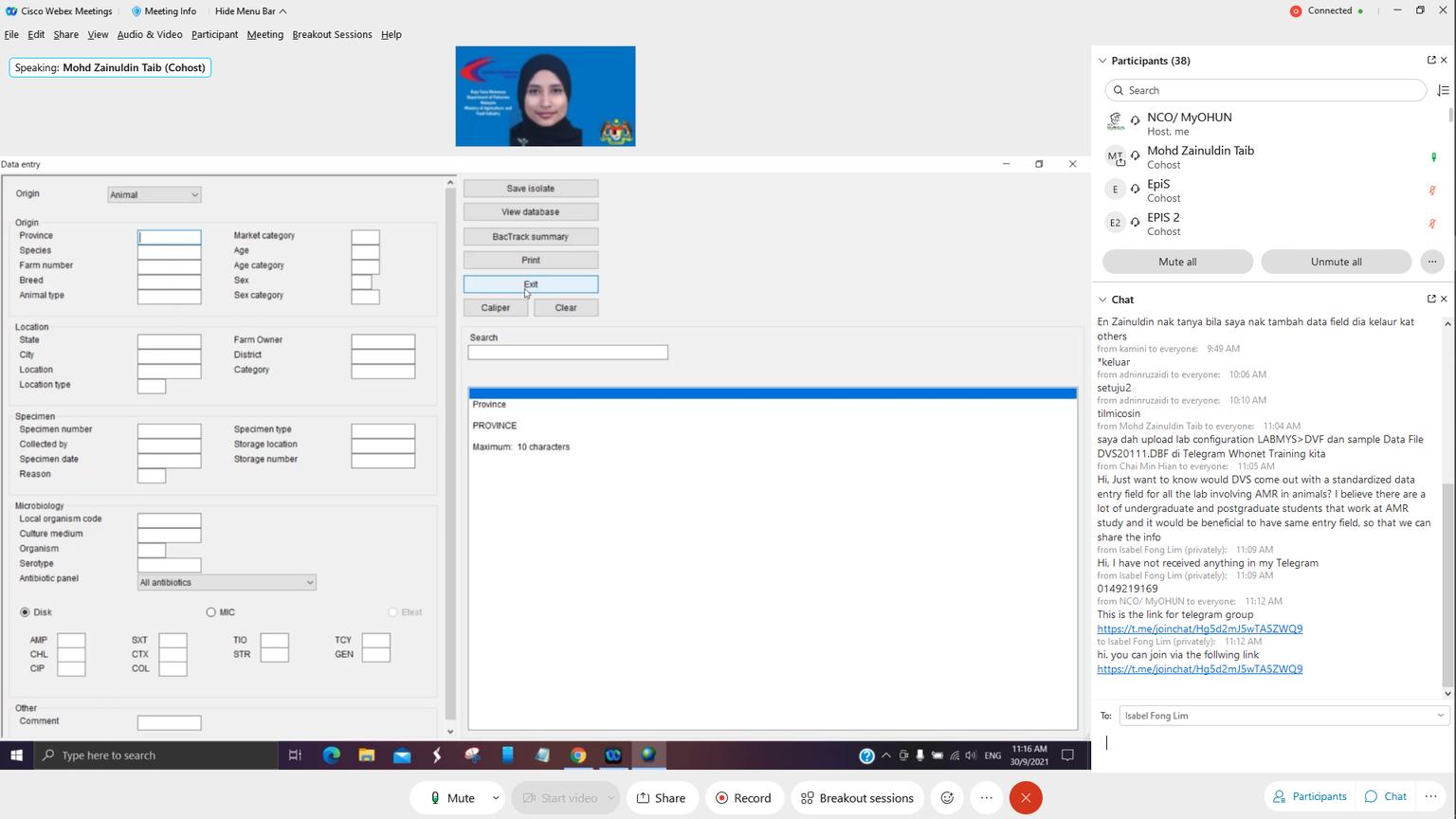


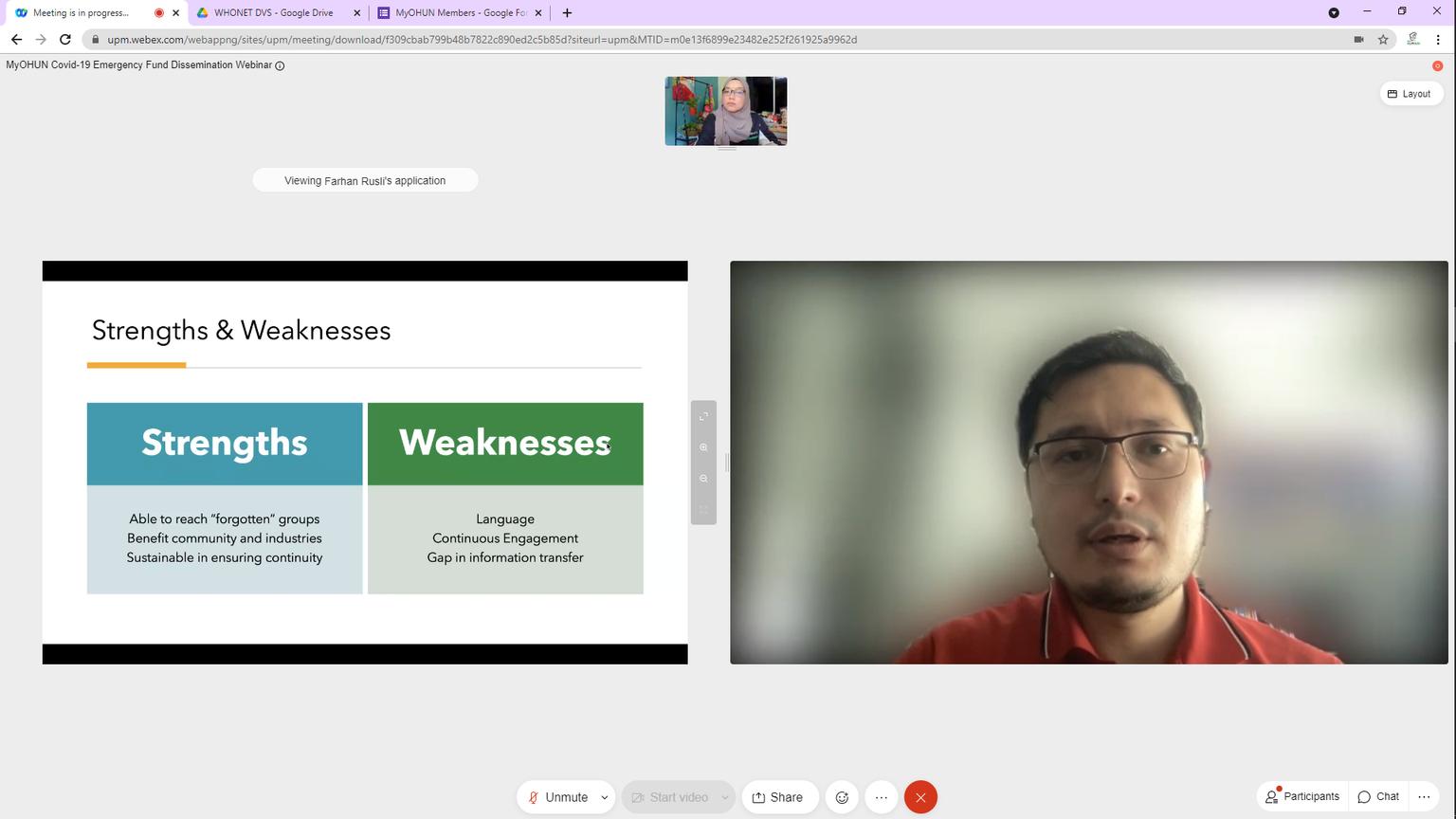
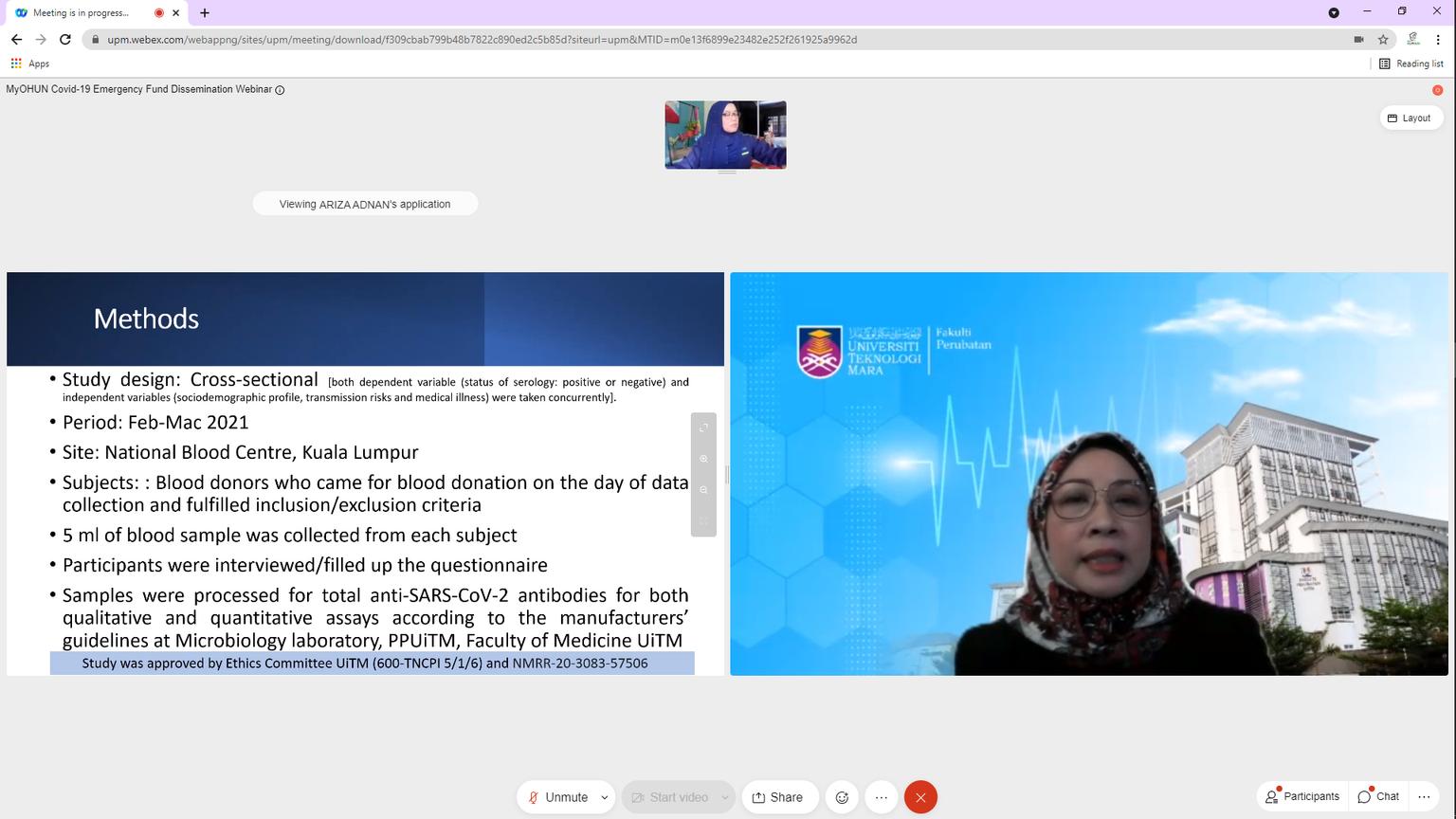
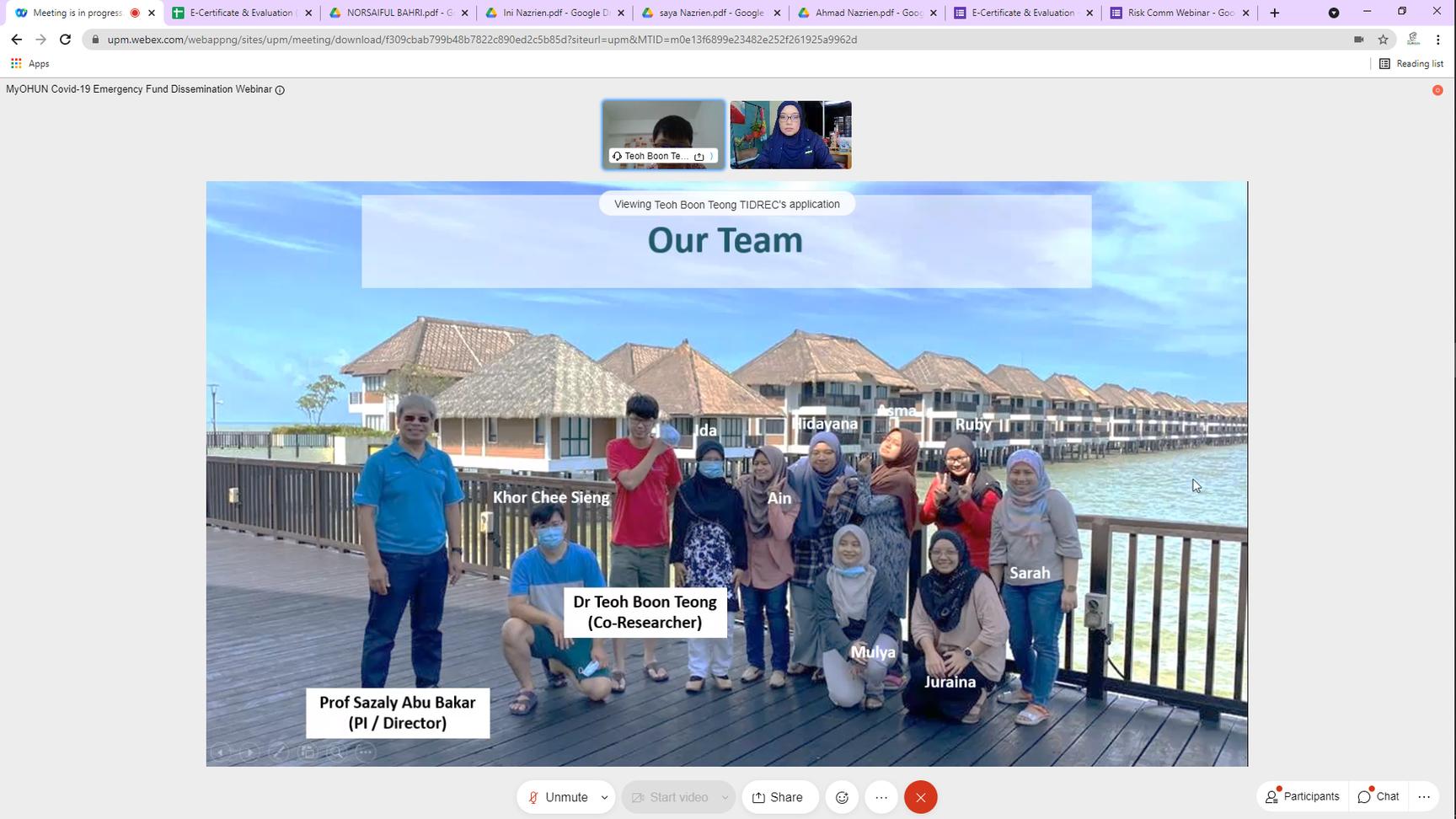
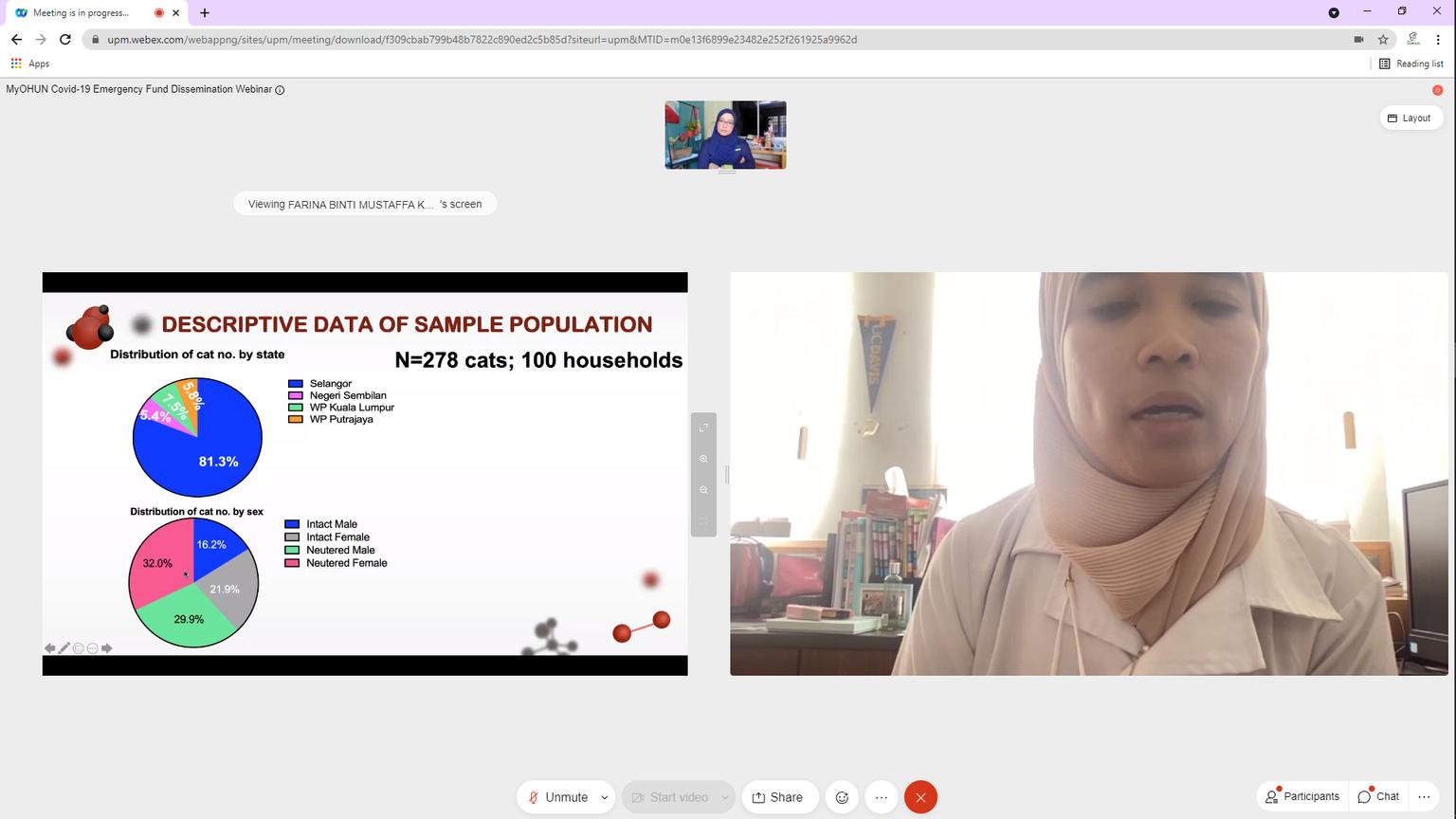
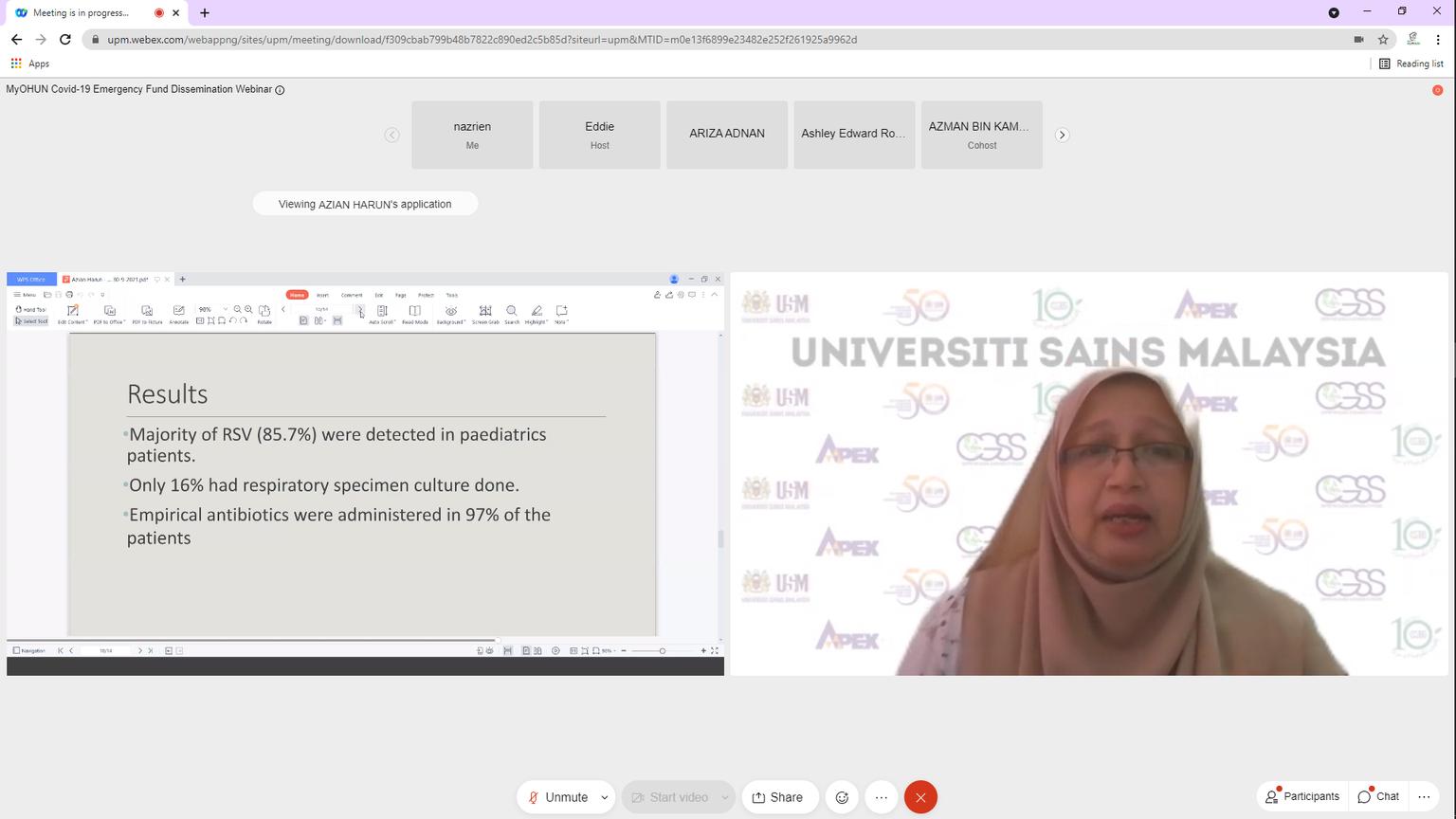



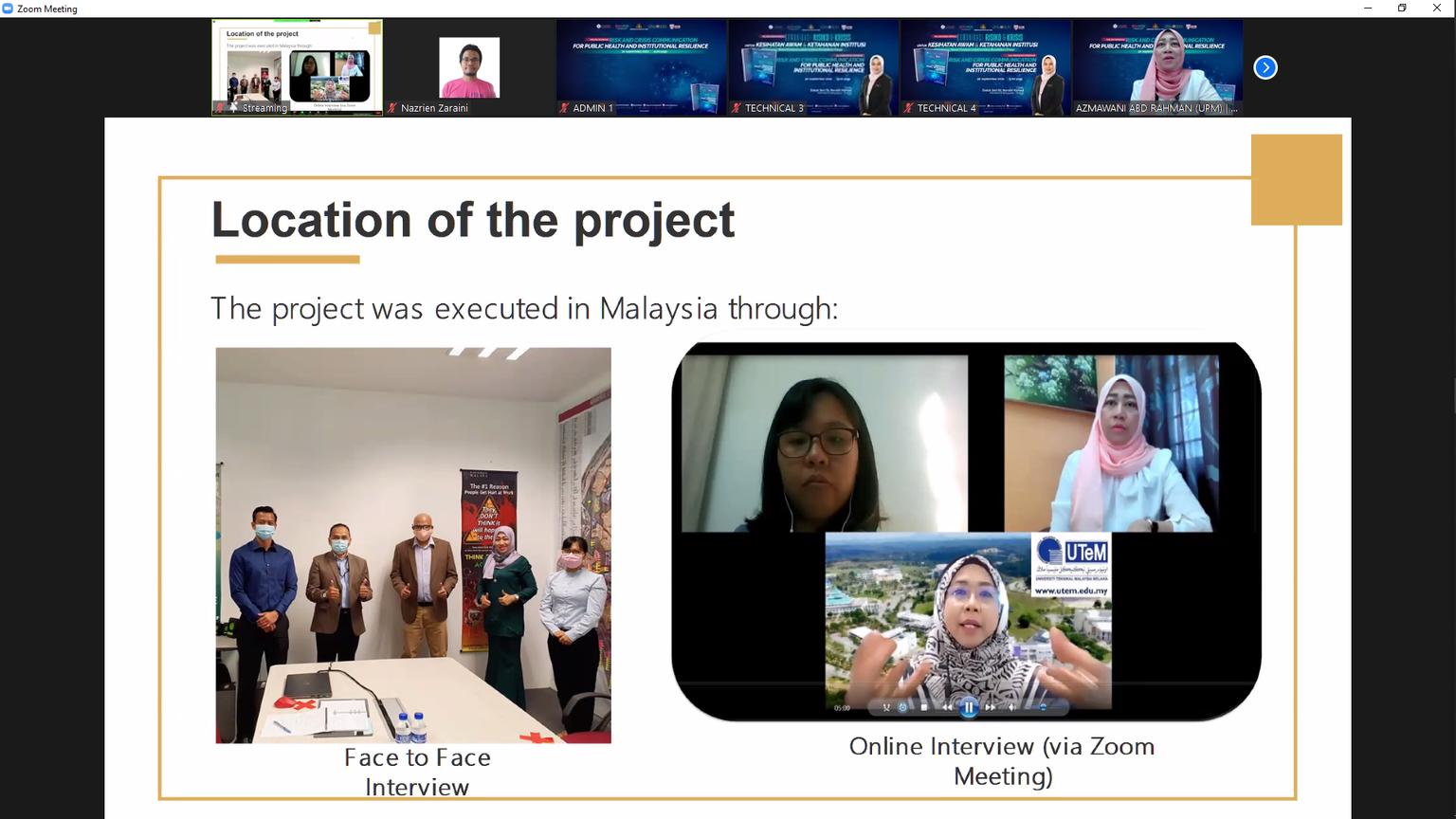







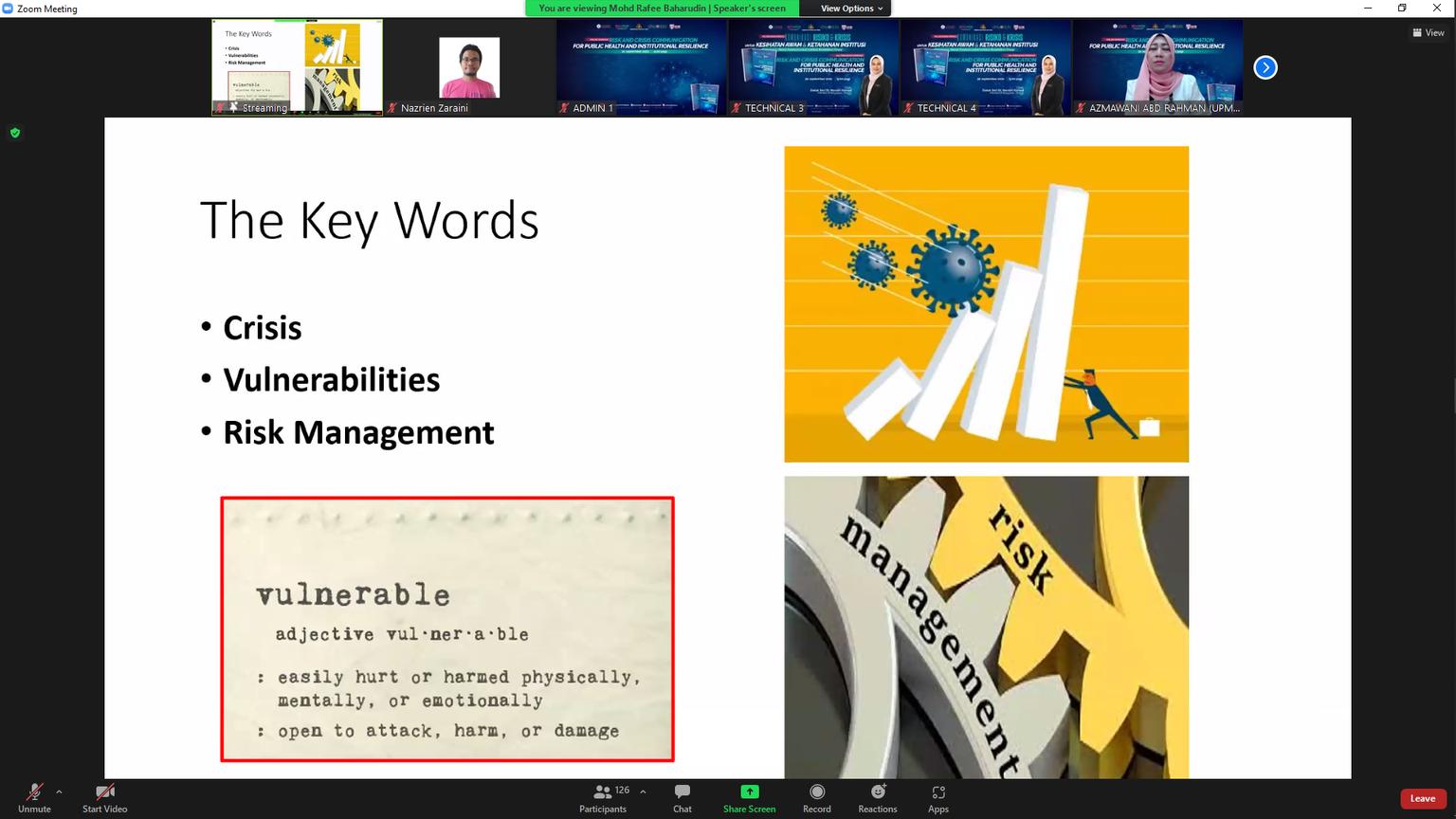
“National Coordinating Office (NCO) – MyOHUN is committed to achieve excellence in providing its services in One Health activities through a quality management system that is constantly improved upon to satisfy the needs of our customers in accordance with MS ISO 9001:2015”

The MyOHUN National Coordinating Office (NCO) was awarded the International Organization for Standardization (ISO) 9001:2015 in recognition of the NCO’s Quality Management System (QMS) on 30 May 2018. In achieving this certification, it highlights the efficiency of the NCO’s QMS in the provision of the coordination and management of activities by MyOHUN. In order for MyOHUN to be awarded the certification, NCO MyOHUN has gone through Surveillance Audit, Internal Audit, ISO Awareness Workshop both in 2017 and 2018 as part of the requirement for upgrading the certification.



